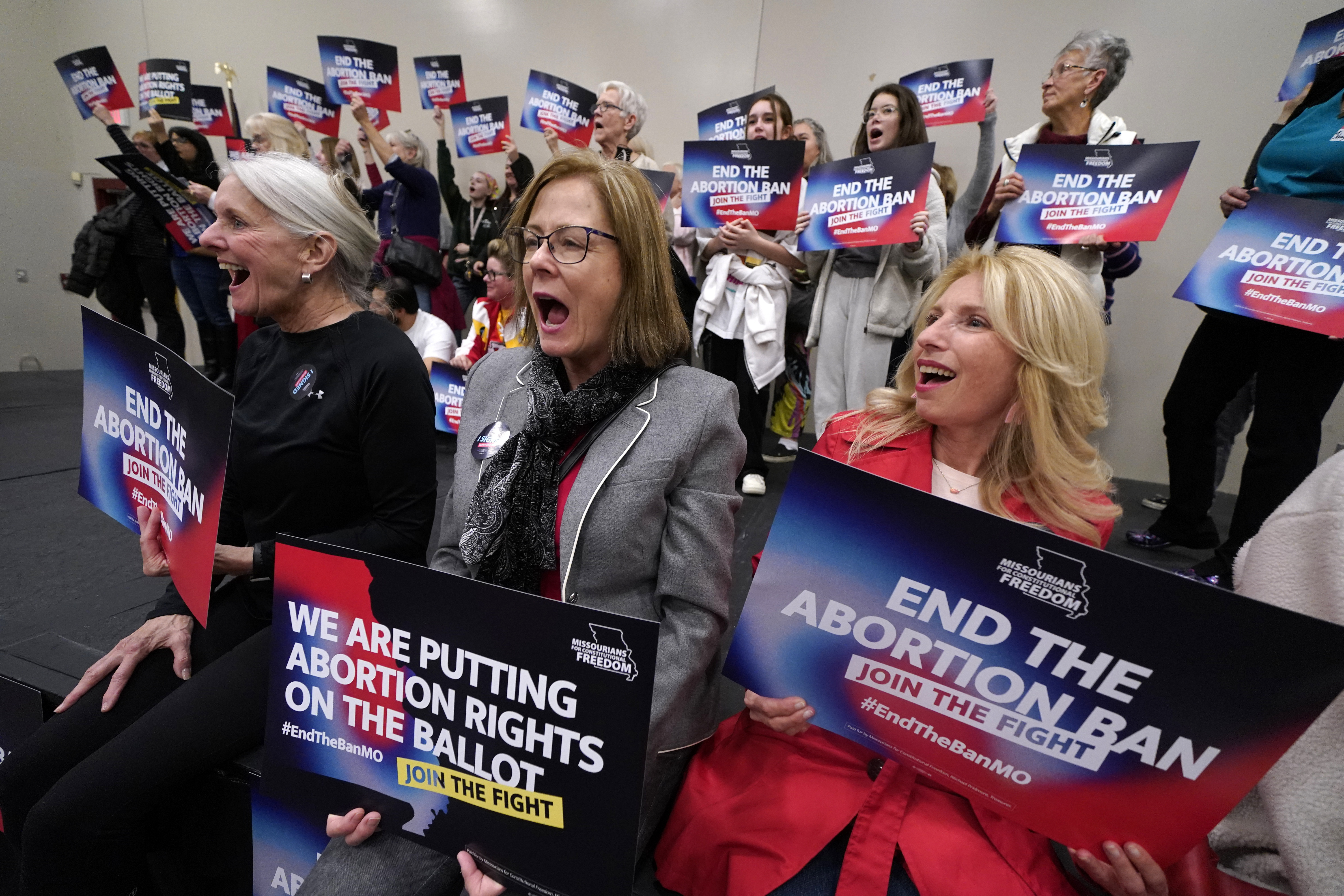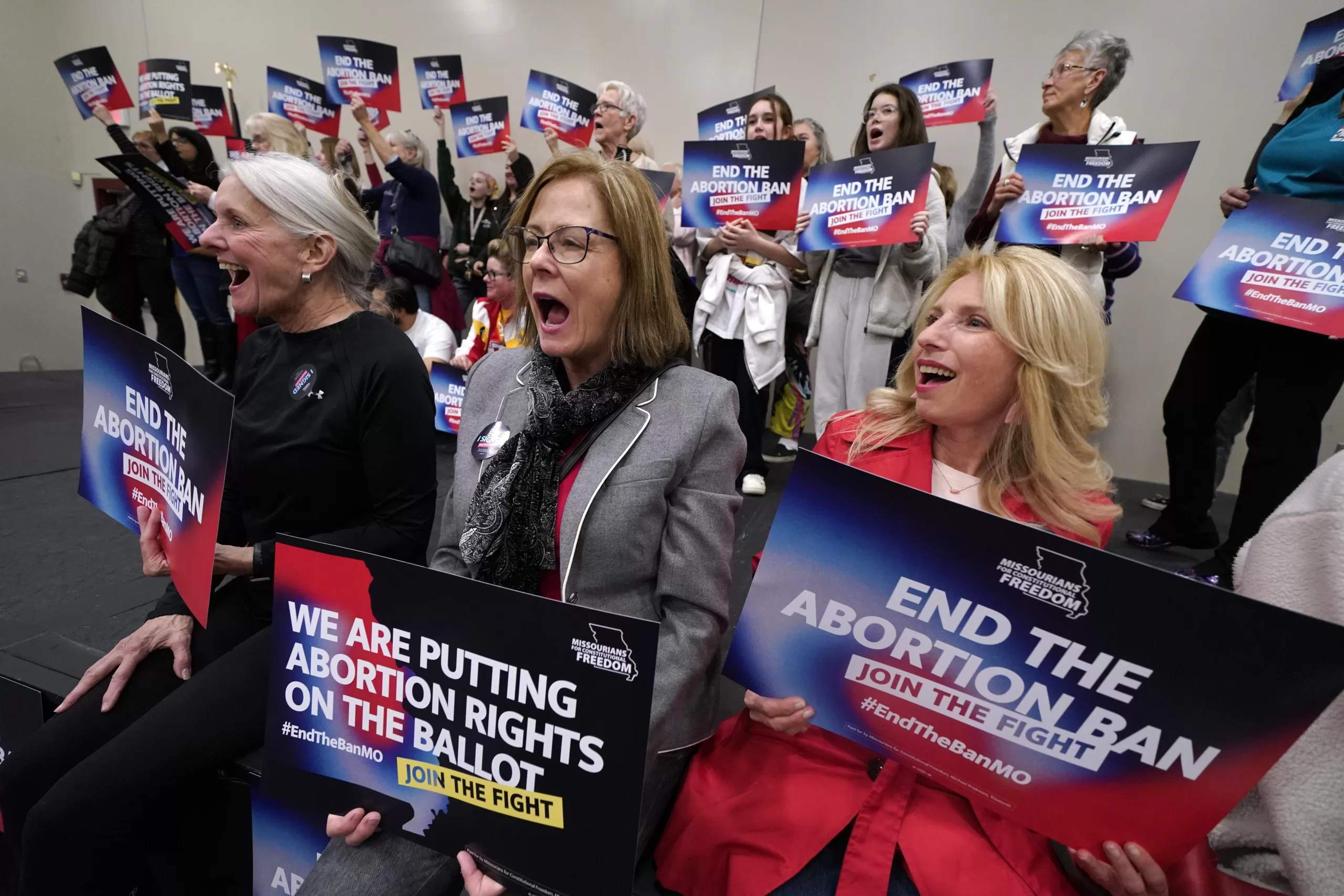
The scramble is pitting abortion-rights supporters in states with near-total bans against those in states where abortion is legal but under threat against those in battleground states
where Democrats hope a strong abortion access campaign will juice turnout and propel President Joe Biden and congressional candidates to victory.
“If we had an unlimited budget, which we don’t, and unlimited staffing, resources and all of that, then there’d be an expanded map I would like to make a run at, because it is such a crisis,” said Deirdre Schifeling, the chief political and advocacy officer for the American Civil Liberties Union. “But these campaigns are incredibly expensive, so we need to see all the right pieces in place to know where we can be successful.”
The ACLU is one of a handful of organizations, along with Planned Parenthood, Reproductive Freedom for All, the Fairness Project, Think Big America, Open Society Foundations and the progressive nonprofit Tides Foundation that are expected to collectively spend tens of millions this year to help codify abortion rights in state constitutions. These groups are agonizing over where their dollars could have the most impact, telling POLITICO they are weighing the substance of the ballot measure proposals as well as the political and legal hurdles they have to clear, how well they’re polling and their effect on the 2024 election.
The campaigns on the short end of these decisions could find themselves starved of the cash needed to gather petition signatures, beat back
attempts from GOP officials to block the measures and persuade voters to restore access to millions of people.
“No one’s coming to save us,” said Gennie Diaz, executive director of the group For AR People, which is leading Arkansas’ ballot measure campaign. “We don’t begrudge any group for having a nuanced strategic plan that we don’t necessarily fit into. … But if we do not receive the funding to run a robust statewide campaign, the consequence will be that women will die in this state. We need that funding so we can restore access and prevent that from happening.”
Diaz said that without seven-figure support — the kind of money that almost certainly needs to come from large organizations — they may be able to qualify the measure for the ballot but likely can’t win in November. They’ve received zero so far from national groups, and have cobbled together just $30,000 from small-dollar donors.
Progressive organizations are avoiding the state because they believe Arkansas’ ballot measure, which would override the state’s near-total ban and restore abortion protections through 20 weeks of pregnancy instead of Roe’s standard of around 24 weeks, is too restrictive and sets a bad precedent for future efforts.
“Our motto is, ‘No steps backwards,’” said Beth Huang, civic engagement and democracy program officer for the Tides Foundation. “Roe is the floor, and we are prioritizing measures that reestablish the floor. We don’t want to support policies that enable backsliding.”
Arizona, a presidential and Senate battleground state where courts could implement a near-total abortion ban at any time, has so far drawn support from the most national groups — raking in more than $5.8 million as of December, including large sums from national organizations like the Fairness Project, Illinois Democratic Gov. JB Pritzker’s nonprofit Think Big America and the Advocacy Action Fund, a nonprofit dark money group that does not have to disclose its donors.
Nevada, another presidential swing state with a crucial Senate race, has received $1.8 million, even though abortion is already legal there and the proposed amendment wouldn’t take effect until 2026.
Mike Ollen, a senior adviser for Think Big America, pitched a two-pronged approach — prioritizing direct investment in ballot measures while not being “naive to the threat of a national abortion ban.” That’s why his organization, he said, will also “work to ensure anti-choice politicians do not gain control of both chambers of Congress.”
Past abortion referendum fights, however, have
not proven to be a reliable booster for Democrats running on the same ballot, and some activists are warning against making electoral politics too big a factor in funding decisions.
Colorado and Florida are not thought to be in play in the 2024 election but both serve as regional hubs for people traveling from nearby states with anti-abortion laws and campaigns there have raised more than $1.3 million and more than $17 million, respectively. Colorado’s measure would codify the right to abortion throughout pregnancy in the state constitution and allow state funding for the procedure. Florida’s would nullify both the state’s active 15-week ban and a pending 6-week ban.
It won’t be clear until this summer whether the majority of the pro-abortion-rights campaigns gather enough signatures and clear the legal or bureaucratic hurdles needed to make it to the ballot, and many deep-pocketed national organizations stressed that they will reevaluate their funding strategy as the year goes on.
In Florida, for instance, groups like the Fairness Project are waiting to see if the state Supreme Court
allows the measure to go forward before investing millions. But other organizations, like the Tides Foundation, Open Society and Planned Parenthood, believe that the state is so crucial for abortion access that they’ve been willing to shell out hefty sums to give the proposal a fighting chance.
“Florida is the second-largest abortion-providing state in the country. The South is a real desert for reproductive health care. We think the six-week abortion ban would be devastating for abortion access in the South and then also the entire Caribbean,” Huang said. “It goes so far beyond the 20 million people who live in Florida.”
At the bottom of most of the organizations’ lists are Arkansas and South Dakota, two states where abortion is illegal in nearly all circumstances but where proposed ballot measures would only restore some access.
Major groups — including Planned Parenthood and the Fairness Project — told POLITICO those state proposals have “shortcomings” and don’t “align with our values.” Diaz and other red-state activists say they would have adopted more expansive measures if they believed they could pass in such deeply conservative states.
“Do we sit on our hands and have ideological purity with our views on this or do we pursue what we can get now and then really hope that this limited restoration of access is going to save people’s lives and get people the health care they need?” she asked.
Diaz and other ballot measure proponents in those states argue their proposals would make a big difference, saving patients from having to travel hundreds of miles for care. But neither state effort has received any national funding, leaving them to cobble together small-dollar donations to pay for things like polling, signature gathering, legal work and ads.
“The challenge when you’re in one of these more obscure rural states is getting people to actually care and realize that we have people out here that are suffering under one of the most extreme abortion bans in the whole country,” said Adam Weiland, co-founder of Dakotans for Health, which is backing the South Dakota measure. “There was some question on our measure not going far enough … but we’re kind of in the basement here in South Dakota.”
Along with unease that Arkansas and South Dakota’s proposals keep some abortion restrictions in place, groups gave POLITICO a litany of reasons they are hesitant to support various campaigns, pointing to Florida’s hostile political and legal climate, and the lack of a threat to abortion rights in New York, Maryland and Colorado. Several groups also stressed that polling has influenced their decisions. They want to spend resources where they’re confident an abortion-rights ballot measure can not only win but win decisively.
“You have to start from a very, very strong place in order to overcome the viciousness of the opposition,” said Schifeling of the ACLU’s criteria. “You have to start from a very lopsided place in terms of voter sentiment.”
Weak polling is what is, for now, keeping the ACLU and other organizations away from Nebraska, where a ballot measure could undo the state’s 12-week abortion ban, while recent strong polling helped persuade them and others to jump into the fight in Missouri, where a coalition is trying to knock down a near-total ban.
“You didn’t see me talking about Missouri six months ago,” said Kelly Hall, the executive director of the Fairness Project. “But you do now.”
The broader goal for activists pushing for constitutional amendments enshrining abortion rights and the donors behind them is to extend the
unbroken winning streak since the Dobbs ruling in the summer of 2022. And since Kansas kicked off the post-Roe abortion ballot measure fight in August of that year, the pro-abortion-rights side has massively outraised and outspent their anti-abortion opponents in red and blue states alike. In Michigan, for example, progressives raked in
more than double the funding of their anti-abortion rivals in the lead-up to their victory in the fall of 2022.
Anti-abortion groups are vowing to catch up and beat back these ballot measures. Susan B. Anthony Pro-Life America, one of the biggest national groups, plans to spend a record $92 million this year — some of which will go toward door-knocking in Arizona, Montana and other states where they hope to persuade voters to reject abortion-rights initiatives. The group
spent $78 million in 2022, and after several ballot measures and congressional candidates they backed
fell short that year and in 2023, they
scolded conservative donors for not stepping up to the plate.
“We need as even a fight as we can when it comes to the money. We have to raise the money now and we have to raise awareness now,” SBA’s state affairs director Kelsey Pritchard told reporters in January. “We have to be aggressive even in states where we’re not sure if it’s going to be on the ballot.”
